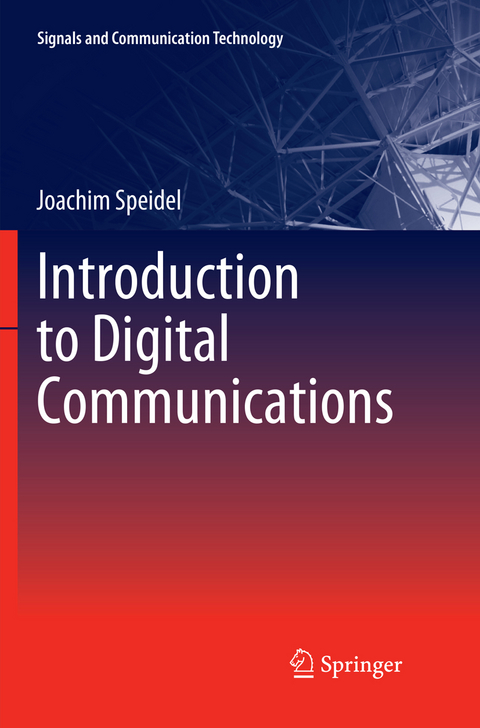
Introduction to Digital Communications
Springer International Publishing (Verlag)
978-3-030-13123-4 (ISBN)
This book offers students, scientists and engineers an extensive introduction to the theoretical fundamentals of digital communications, covering single input single output (SISO), multiple input multiple output (MIMO), and time-variant systems. Further, the main content is supplemented by a wealth of representative examples and computer simulations.
The book is divided into three parts, the first of which addresses the principles of wire-line and wireless digital transmission over SISO links. Digital modulation, intersymbol interference, and various detection methods are discussed; models for realistic time-variant, wireless channels are introduced; and the equivalent time-variant baseband system model is derived.
Since not all readers may be familiar with this topic, Part II is devoted to the theory of linear time-variant systems. The generalized convolution is derived and readers are introduced to impulse response, the delay spread function, and system functions in the frequency domain. In addition, randomly changing systems are discussed.
In turn, Part III deals with MIMO systems. It describes MIMO channel models with and without spatial correlation, including the Kronecker model. Both linear and nonlinear MIMO receivers are investigated. The question of how many bits per channel use can be transmitted is answered and maximizing channel capacity is addressed. Principles of space-time coding are outlined in order to improve transmission quality and increase data rates. In closing, the book describes multi-user MIMO schemes, which reduce interference when multiple users in the same area transmit their signals in the same time slots and frequency bands.
Joachim Speidel earned his engnineering degree with a specialization in theoretical telecommunications from the University of Stuttgart in 1975 followed by a PhD in 1980. From 1980-1992 he worked for Philips Kommunikations Industrie AG (today Alcatel Lucent). In 1985, while working as a development engineer, he and his team built the first video encoder for 2 megabit/s and played an important role in the standardization of new methods. His work in research and development covers a wide range of areas such as video and subscriber systems. During his time at Philips he held various positions including development engineer, lab manager, general manager and director of a product area. In 1992 he became a Professor at the faculty of Computer Science, Electrical Engineering and Information Technology at the University of Stuttgart and was appointed Director of the Institute of Telecommunications. His research area includes telecommunications in wireless, fixed, electrical and optical networks with focus on encoding, modulation, detection and MIMO systems. In 2013 he passed on leadership of the institute to his sucessor, Prof. Dr.-Ing Stephan ten Brink, and now maintains a research professorship at the institute. Through his numerous publications and patents, Prof. Dr. Speidel has made extensive contributions in the advancement of the field of telecommunications, the success of its products and international standards. He is a member of various national and international organisations and advisory and review boards.
Part I: Digital communications over single input single output channels.- PART II: Theory of linear time-variant systems.- PART III: Multiple Input Multiple Output wireless transmission.
| Erscheinungsdatum | 26.10.2019 |
|---|---|
| Reihe/Serie | Signals and Communication Technology |
| Zusatzinfo | XVII, 330 p. 69 illus., 28 illus. in color. |
| Verlagsort | Cham |
| Sprache | englisch |
| Maße | 155 x 235 mm |
| Gewicht | 539 g |
| Themenwelt | Mathematik / Informatik ► Informatik ► Theorie / Studium |
| Mathematik / Informatik ► Mathematik ► Angewandte Mathematik | |
| Technik ► Elektrotechnik / Energietechnik | |
| Technik ► Nachrichtentechnik | |
| Schlagworte | Equivalent time-variant baseband system • Frequency flat MIMO channel matrix • Intersymbol interference reduction • Mathematical description of time-variant systems • Maximum likelihood detection • MIMO channel capacity • MIMO system with precoding • Multipath wireless channel • Multi-user MIMO and multi-user interference • Nyquist criterion for data transmission • Random variables and noise in communications • Rayleigh fading channel • space-time coding • Symbol-by-symbol and sequence detection • Time-variant generalized convolution • Time-variant impulse response • Time-variant transfer function • Viterbi Algorithm • Wide-sense stationary uncorrelated scattering • Zero-forcing and minimum mean squared error receiv • Zero-forcing and minimum mean squared error receiver |
| ISBN-10 | 3-030-13123-8 / 3030131238 |
| ISBN-13 | 978-3-030-13123-4 / 9783030131234 |
| Zustand | Neuware |
| Informationen gemäß Produktsicherheitsverordnung (GPSR) | |
| Haben Sie eine Frage zum Produkt? |
aus dem Bereich


